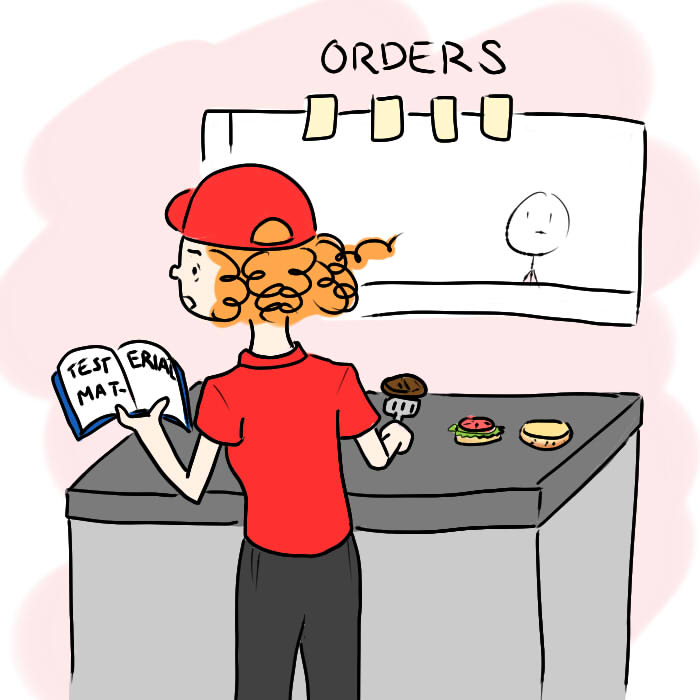What is work-study?
Work-study is a program that helps students earn money to help with their education expenses.
How does work-study help you? Working as part of the work-study program can help you lower your overall education costs by allowing you to take on fewer student loans. Work-study jobs are typically entry-level office jobs, but they offer a good experience and can be a lot of fun.
This term reflects a combination of both formal education (such as school) and hands-on learning through real-life experience.
For example: Working in a supermarket can be considered as "work-study" because you are receiving training while earning an income. Your employer this as an opportunity for you to get work experience and at the same time, they get an employee.
The money you earn through work-study is treated almost like a grant that does not have to be paid back. This means that regardless of how much money you earn, it will not affect your financial aid package and you do not pay taxes on the amount of money you make (this is true for all grants).
Work-study, like any other job, requires some effort and patience. You will not get rich but you'll feel good about yourself and your earnings will cover the expenses of your everyday life and study, which is what we all want. Work-study can be a great experience for those who are willing to work on campus and don't know how to start their career!
The first question that comes to mind is - "what return do I expect from doing this?" Because if there's no definite answer then there's little reason to invest time into something that doesn't really pay off. There are many factors that contribute to your success as a work-study student employee. Working part-time can be a great way to gain experience and earn money for school.

Who can qualify?
Work-study is available only to undergraduate students who file the FAFSA (Free Application for Federal Student Aid) form; eligibility is determined by information supplied on this form. If you are interested in participating in this program, contact your college's financial aid office and ask about their specific requirements for determining eligibility.
Work-study is available to any student who qualifies for Pell Grants, which is the majority of students. To qualify, your family can't make more than $18,090 annually (a school year). This amount changes every year.
Once you are eligible, the financial aid office at your college, not you or your employer, will determine how much financial aid you are awarded. Your wages will be part of this amount.
Working on campus can bring great advantages to students who are considering getting an extra job while studying in order to make more money, but it's not easy. It requires a lot of dedication and commitment since work-study opportunities don't come easily and they require time management skills in order for one to succeed in such a competitive environment!
With that said - if you've got what it takes then go ahead and apply!
Students usually start filling out their work-study applications in November or December of their sophomore year of high school. It's important to fill it out as soon as possible because placement is limited and available jobs go quickly. The earlier you apply, the more options you have!
If I'm enrolling for courses does this affect my eligibility?
No, enrolling in courses does not mean you will lose your work-study eligibility. On the contrary, by enrolling in courses you will be increasing your financial aid package which means more money for your books and other expenses!
What will I do on work-study?
As a work-study student, you'll need to complete ten hours of work per week. In addition, you must get at least three hours of classroom/lab instruction every week.
In other words: your employer will help you balance your course load by scheduling shifts that do not fall on days when you have classes. Your primary responsibility during the day will be providing service to customers and helping with general store operational tasks. Examples: stocking merchandise, serving customers, handling money transactions, etc.
Will it take time away from my study?
Work-study jobs are part-time, so you should not worry about the time it will take away from your study. Work-study is designed so you can be successful in school while working on campus. Your employer will help organize your work schedule around your class schedule.
You'll also receive additional financial aid to cover transportation costs and provide support with ensuring that you get to class on time!
But wait! There is one more question...

How does this affect my social life?
Will you have time to go out with friends or hang out at all after college? Well - it doesn't sound like much fun but be sure if you are doing work-study you will have a lot of free time for other activities.
The more hours you put in at your work-study job, the more money you'll make - but these extra hours will come at the expense of personal time! A part-time job on campus is both an academic and financial responsibility.
This doesn't mean that it's not worth it, however. It just means that you should be prepared to spend most of your weeks working - so don't expect to have much time left over for socializing or entertainment.
What should I do if a work-study job becomes unavailable?
If a job has been canceled due to a lack of interest from other students, don't give up hope just yet! The University may still be looking for other students who would be interested in the job. You can send your resume to Student Employment after filling out the work-study application, and they will contact you if there are any other opportunities available.
The best thing to do is get your application into Student Employment as early as possible. Jobs fill up fast!
When should I start applying for a work-study job?
You should start applying for work-study jobs around November of your junior year of high school. Be sure to read over all the requirements before beginning your application! The earlier you apply, the more options you have!"
Pros and cons of work-study
Disadvantages of work-study:
Some students think work-study is not worth it because they can't find jobs on campus that are ideal for them. This may be true, however working in the work-study program can really help lower your education costs through less student borrowing.
Why do people think it's not worth it - you can see yourself.
Work-study disadvantages:
-
The pay rate is sometimes quite low for the amount of time worked;
- Work-study does not always lead to permanent employment at the institution after graduation;
- Mandatory meetings suck up more of your time than expected.
By doing something you enjoy, you may feel like the job takes up more of your time than expected. It's important to realize that if this is a mandatory requirement of your financial aid package, there probably isn't much flexibility. There are still many benefits!
Advantages of work-study:
Some students think work-study is worth it because they get to enjoy on-campus jobs and careers while covering part of their education costs.
Other students really enjoy on-the-job training and networking opportunities with peers and faculty. You may even discover a new passion or career path! Some on-campus jobs offer good experience for after graduation, but also some benefits such as:
- discounts at movie theatres and restaurants on campus
- free tickets to concerts and athletic events on campus
- free tuition for your children in the future if you decide to stay working here after graduation
Moreover, work-study hours are usually set depending on your class schedule, so you won't have to work during busy exam times.
Also here you will not find so much competition among candidates as in a private company, because many students want this job and the number of vacancies is limited.
In addition, there are some other things to keep in mind:
- Work-study jobs usually don't require relevant experience (in contrast to off-campus jobs)
- Your resume will list work-study experience right under your university employment hours. So you get free professional experience!
Again, it should be mentioned, that most jobs are located in your campus community, so you save money on commuting and parking.
Work-study jobs provide a great way to meet new people and develop your social skills at the same time. You will begin to feel more connected with faculty and other students who share similar interests.
Work-study is also a great way to learn about your strengths and weaknesses as an employee. It's a good experience that can help you land full-time work after graduation from college.
Is work-study worth it?
The answer is that Work-study can be very valuable. If you work on average 10 hours a week every school term, then the cost of your work-study job each year is around $3500. In many cases, this may be less than what want to take out in student loans.
The costs of work-study are also lower because there are no taxes taken out of work-study earnings ( however you will have taxes withheld from your paycheck ). In exchange for working an average of 40 hours a month at a pay rate of around $9 per hour, you get a lot more value than just the money itself. As a work-study student worker, you get:
- Experience at a real job with the potential for advancement
- A flexible schedule and some free time on weekdays to pursue other activities
- On-campus job security as long as you're enrolled in school.

How much money do I get after taxes?
The Federal Work-study (FWS) program provides opportunities for students to earn funds while studying at the university.
The FWS program applies when credit hours are greater than 6 in a given term. Under this program, the University offers part-time employment opportunities to eligible students who may choose among jobs that are open nationally to all qualified applicants or jobs that are targeted toward specific populations (e.g., veterans, minorities).
Students will be paid hourly wages according to their primary occupation and qualifications. Only undergraduate students receiving financial aid may participate in the FWS Program; graduate students may not apply for FWS jobs unless they receive Perkins Loans. For a list of current FWS job postings, please visit the Hire-A-Niner website. University funds are limited and subject to availability.
Income from work-study jobs will be reported as self-employment income on your federal income tax returns. In addition to gross earnings, FICA taxes (Social Security and Medicare) must also be paid by both employer and employee.
However, unlike most other employment, there is no "employer" or university agency acting as a withholding agent for federal, state, or local taxes. Consequently, the money earned from a work-study job usually does not have withholding taken out of it since there is no withholding agent. An individual's tax situation varies greatly depending upon his/her own specific circumstances. The best person to give advice about the taxation of work-study earnings is a tax preparer.
Work-study students are expected to report all income received for work performed in the Work-study program through their University paying agency before filing their yearly FAFSA or renewal application. If you have questions regarding this, please contact Financial Aid directly.
Conclusion
If you are eligible then it is recommended to take advantage of this program. You can keep track of your earnings on your To-Do List tab under Financial Aid. Once you are finished with each term just remind yourself to report it on next year's FAFSA and aid renewal application. You can use it to pay down your loans or to contribute to your retirement fund if you are investing.